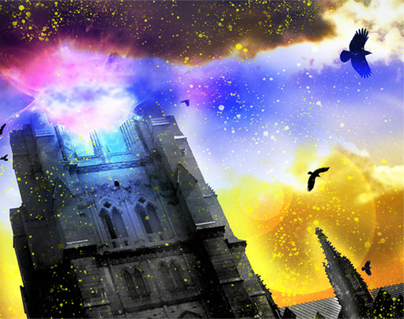 Have you ever felt that the things that are happening around you have happened before? Have you felt that the situation you are in now has been faced by you before? Then it means that you have experienced Deja vu. Recently when I was watching Barack Obama's mesmerizing speech at Cairo, I experienced Deja vu. It was then that I decided to digg more into Deja vu and here I would like to share whatever I have realised about Deja vu.
Have you ever felt that the things that are happening around you have happened before? Have you felt that the situation you are in now has been faced by you before? Then it means that you have experienced Deja vu. Recently when I was watching Barack Obama's mesmerizing speech at Cairo, I experienced Deja vu. It was then that I decided to digg more into Deja vu and here I would like to share whatever I have realised about Deja vu.Deja vu is a French word that means "already seen". It is also called paramnesia, which in turn has been derived from Greek word "para," meaning "near" and "mnēmē" meaning "memory". Deja vu is the experience of feeling sure that one has witnessed or experienced a new situation previously (an individual feels as though an event has already happened or has happened in the near past), although the exact circumstances of the previous encounter are uncertain.
The term was coined by a French psychic researcher, Émile Boirac (1851–1917) in his book "L'Avenir des sciences psychiques" ("The Future of Psychic Sciences"), which expanded upon an essay he wrote while an undergraduate. The experience of déjà vu is usually accompanied by a compelling sense of familiarity, and also a sense of "eeriness," "strangeness," or "weirdness." The "previous" experience is most frequently attributed to a dream, although in some cases there is a firm sense that the experience "genuinely happened" in the past.
Scientifically theories state that the most likely explanation of déjà vu is not that it is an act of "precognition" or "prophecy," but rather that it is an anomaly of memory giving the impression that an experience is "being recalled." This explanation is substantiated by the fact that the sense of "recollection" at the time is strong in most cases, but that the circumstances of the "previous" experience (when, where, and how the earlier experience occurred) are quite uncertain. Likewise, as time passes, subjects can exhibit a strong recollection of having the "unsettling" experience of déjà vu itself, but little or no recollection of the specifics of the event or circumstance they were "remembering" when they had the déjà vu experience.
In particular, this may result from an overlap between the neurological systems responsible for short-term memory (events which are perceived as being in the present) and those responsible for long-term memory (events which are perceived as being in the past). The events would be stored into memory before the conscious part of the brain even receives the information and processes it.
On the other hand there are people who have a whole new perception about Deja vu being related to vision. As the theory suggests, one eye may record what is seen fractionally faster than the other, creating that "strong recollection" sensation upon the "same" scene being viewed milliseconds later by the opposite eye. However, this one fails to explain the phenomenon when other sensory inputs are involved, such as the auditive part, and especially the digital part. If one, for instance, experiences déjà vu of someone slapping the fingers on his left hand, then the déjà vu feeling is certainly not due to his right hand experiencing the same sensation later than his left hand considering that his right hand would never receive the same sensory input. Also, persons with only one eye still report experiencing déjà vu or déjà vécu (a rare disorder of memory, similar to persistent déjà vu).
Coming up with a whole new idea are people who believe déjà vu is the memory of dreams. Though the majority of dreams are never remembered, a dreaming person can display activity in the areas of the brain that process long-term memory. It has been speculated that dreams read directly into long-term memory, bypassing short-term memory entirely. In this case, déjà vu might be a memory of a forgotten dream with elements in common with the current waking experience. This may be similar to another phenomenon known as déjà rêvé, or "already dreamed." However, later studies on mice indicate that long-term memories must be first established as short-term memories.
And now if you are a person who beleives in rebirth then you may be allured to know that some scientists have also related Deja vu to reincarnation. Those believing in reincarnation theorize that déjà vu is caused by fragments of past-life memories being jarred to the surface of the mind by familiar surroundings or people. Others theorize that the phenomenon is caused by astral projection, or out-of-body experiences (OBEs), where it is possible that individuals have visited places while in their astral bodies during sleep. The sensation may also be interpreted as connected to the fulfillment of a condition as seen or felt in a premonition.
Despite the existance of numerous theories and viewpoints on Deja vu, there has not yet been a clear cut idea on Deja vu. Research on Deja vu is not a cakewalk since, creating the feel of Deja vu under laboratory conditions is next to impossible. Still there are vigorous researches being conducted on this mystfying phenomena of the mystic brain. As of now Deja vu is yet annother addition to the list of mysteries in this perplexing, mysterious Universe.






0 comments:
Post a Comment